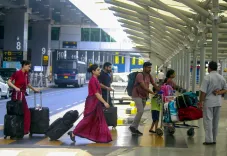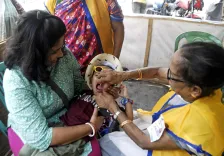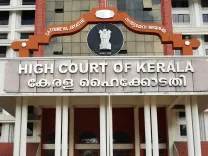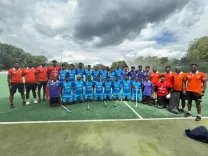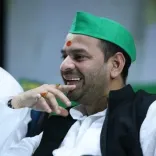What Experiments is Shubhanshu Shukla Conducting in Space?
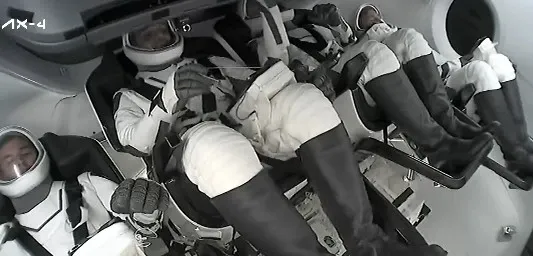
Synopsis
Key Takeaways
- Shubhanshu Shukla becomes the first Indian astronaut to reach the ISS.
- Conducting seven key experiments focused on food and nutrition in microgravity.
- Collaboration between ISRO, DBT, and NASA to pioneer space nutrition.
- Research on cyanobacteria and edible microalgae for sustainable food production.
- Exploration of skeletal muscle dysfunction and therapeutic strategies in space.
New Delhi, June 25 (NationPress) Indian astronaut Shubhanshu Shukla is on his way to the International Space Station (ISS), poised to become the first individual from India to reach this orbital laboratory. He is set to carry out seven crucial experiments in space.
After experiencing at least six delays, Shukla finally launched to the ISS on Wednesday at 2:31 a.m. EDT (12 noon IST), from Launch Complex 39A at NASA's Kennedy Space Center in Florida, aboard a new SpaceX Dragon spacecraft utilizing the company's Falcon 9 rocket.
With this journey, India will see its astronaut in space after a span of 41 years. Shukla will be the second Indian to venture into space, following Rakesh Sharma's historic flight in 1984.
As the mission pilot for Axiom Space's Mission 4, Shukla is joined by three crew members from the US, Poland, and Hungary.
During a 14-day stay at the ISS, the crew will undertake approximately 60 scientific investigations and commercial ventures in microgravity, representing 31 countries, including the US, India, Poland, Hungary, Saudi Arabia, Brazil, Nigeria, UAE, and several nations across Europe.
Shukla's participation includes experiments designed to advance technologies for Axiom's future space station, as well as studying the effects of microgravity on cyanobacteria—a type of bacteria with an anaerobic pathway.
This specific bacteria, known for its ability to convert carbon dioxide into oxygen, played a significant role in Earth's oxygen production.
“Cyanobacteria are being investigated to determine their efficiency in microgravity and their potential use for future missions to create an oxygen-rich environment for crew members,” Shukla revealed in an exclusive interview with IANS in March.
The experiment will focus on the growth rates, cellular responses, and biochemical activities of two variants of cyanobacteria (aquatic bacteria that photosynthesize) in microgravity. These organisms could be instrumental in spacecraft environmental control systems.
The IAF Group Captain is also set to conduct significant food and nutrition studies aboard the ISS.
These experiments, developed through a partnership between the Indian Space Research Organization (ISRO) and the Department of Biotechnology (DBT), with NASA's support, aim to innovate space nutrition and self-sustaining life support systems crucial for long-duration space travel.
His research will also assess the impact of microgravity and space radiation on edible microalgae—a food source rich in nutrients with high potential.
Shukla will investigate the growth of sprouts and edible microalgae, which may provide sustainable food production solutions in space.
Additional experiments will explore physical, cognitive, and physiological responses in space, including the effects of continuous electronic display usage in microgravity—vital considerations for future long-term missions.
The Lucknow-born astronaut will also delve into skeletal muscle dysfunction in microgravity and evaluate potential therapeutic strategies to mitigate its effects.
Moreover, he will conduct experiments involving extremophiles like Tardigrades, tiny organisms renowned for their resilience in extreme conditions.
Shukla plans to expose six types of crop seeds to microgravity conditions, which will subsequently be cultivated on Earth to analyze genetic alterations, microbial load, and nutritional value. This experiment is pivotal for unlocking the potential of future space agriculture.
These groundbreaking experiments are expected to broaden our understanding of how life may sustain itself beyond Earth, playing a vital role in the development of sustainable life support systems in space.
Shukla is piloting the mission alongside Commander Peggy Whitson from the US.
The remaining crew members include Slawosz Uznanski-Wisniewski from Poland and Tibor Kapu from Hungary, both serving as mission specialists.
He is anticipated to dock at the orbiting laboratory around 4:30 p.m. IST on June 26.


